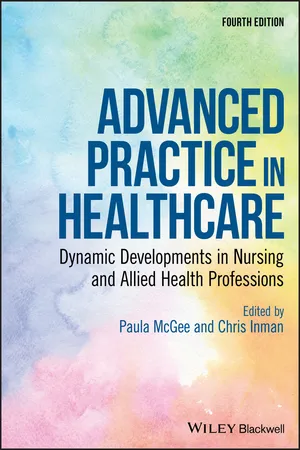1.1 Introduction
Healthcare has never been as good as it is now, in the early twenty‐first century. New knowledge, technology, and the expertise of doctors, nurses, and allied health professionals (AHPs) now make it possible to prevent many diseases, cure others, and alleviate the suffering caused by factors that we cannot yet overcome. The world is now a much better place for human beings than it was, for example, in 1800 (Rosling et al. 2018). As a result, human beings can now lead healthier, more productive, and longer lives than their forebears, providing that they are able to access good‐quality services, which meet their needs and which they experience as acceptable. Unfortunately, this is not always the case, because these advances and advantages are not evenly distributed within or between countries. Escalating costs, poverty, geography, conflict, violence, malnutrition, and lack of basic infrastructure such as electricity and roads are among the many factors that delay, prevent, or even reverse the equitable distribution of healthcare. As a result “many of the 7 billion people who inhabit our planet are trapped in health conditions of a century earlier” (Frenk et al. 2010, p. 7).
Alongside this situation is an increase in communicable diseases. These include viral infections for which there is, as yet, no cure or vaccine: Ebola, Zika, Marburg, and the Lassa virus. The incidence of preventable communicable diseases, such as measles, is rising among unvaccinated populations, including those previously protected by immunization programs; in Europe, 31 deaths from measles were reported in July 2018 (European Centre for Disease Prevention and Control 2018). The influence of the anti vaccination movement is one of the many factors that have affected the uptake of vaccination. Gonorrhea, syphilis, and other sexually transmitted infections are also increasing, particularly among young people (Public Health England 2018a). Even diseases for which cures are available remain highly prevalent. Each year, viral, parasitic, and bacterial diarrheal diseases due to poor sanitation and lack of clean drinking water account for over half a million deaths among children aged under 5 (WHO 2017). The incidence of tuberculosis is declining, but not fast enough to meet Sustainable Development Goal 3; the multi‐drug‐resistant strain of tuberculosis is a major threat to health (United Nations 2015).
Noncommunicable diseases, often associated with increasing affluence and lifestyle, are also increasing in prevalence. Obesity, smoking, alcohol and other substance abuse, lack of exercise, and eating insufficient fruit and vegetables all contribute to the development of disease. An estimated 451 million adults have diabetes, usually Type 2, and many more may be undiagnosed (International Diabetes Federation 2018). Cancer, heart disease, stroke, and respiratory diseases are among the leading causes of death worldwide. Approximately one in four adults and an increasing number of children will suffer from some form of mental illness at least once during the course of their lives. Lack of education and understanding about mental illness can prevent individuals from seeking help and lead some to suicide.
Populations are also changing as large numbers of people seek better economic or social opportunities elsewhere. Some 68.5 million people have become refugees, seeking to escape violence and persecution outside their own countries, and many are displaced within their own nations (United Nations High Commission for Refugees 2018). Their health needs are often complex and multifaceted: untreated long‐term conditions such as diabetes and asthma, injuries sustained as a result of conflict or torture, sexual abuse, pregnancy, and mental health problems arising from these and other health issues.
It is in this context that advanced nursing practice has gradually developed from the work of individual practitioners in rural areas of the USA into a movement that now spans many different countries, societies, and cultures across five continents. Advanced nurse practitioners have shown that, given suitable preparation, they are competent to meet everyday healthcare needs, reduce pressures on hospital services, and develop local solutions to specific health challenges. In doing so, they have also revealed the previously untapped creative potential of nurses to innovate and improve the accessibility and acceptability of health service delivery and care, particularly to members of underserved groups. Local and country‐specific needs have been at the forefront of these developments and, consequently, there is considerable variation in advanced nursing practice roles, work activities, preparation, and regulation (Schober and Affara 2006). In comparison to nursing, the development and impact of advanced practice in allied health professions is less well documented and there is no evidence of a global movement. The UK appears to be one of the few countries that has invested in advanced allied health practitioners; preparation is at the same level as that of advanced nurses. Given the inequitable distribution of health services and care, we argue that advanced allied health professionals have untapped potential to provide accessible, affordable and appropriate care to patients in many parts of the world (WHO 2014).
This chapter examines two issues in advanced practice: competence and variation. It begins with a discussion about competence. There are numerous ideas about this and lists of what advanced practitioners should be competent in, and usually these are examined separately. This discussion differs by emphasizing their interrelatedness under three broad topics: professional maturity, challenging professional boundaries, and pioneering innovations. It also builds on ideas about advanced practice developed through the last two editions of this book, our own research, one author's (PM) experience as a consultant nurse in National Health Service (NHS)...
